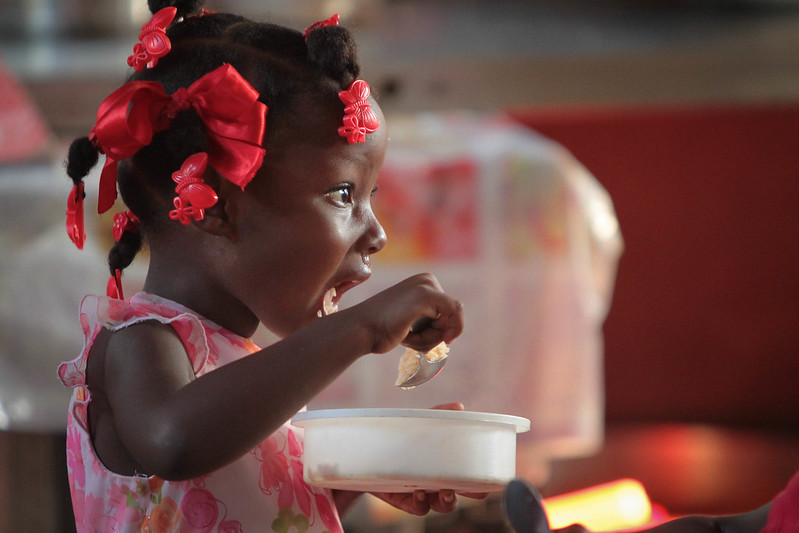Feed the Children is Making a Difference in Haiti

For the last 40 years, Feed the Children has been working toward a hunger-free world by providing resources to those who lack basic necessities. In 2020, Feed the Children has created a substantial impact worldwide and reached countless children and families in need. Most notably, Feed the Children is making a difference in Haiti.
Feed the Children’s Goals
Feed the Children works in Guatemala, Honduras, Haiti, El Salvador, Nicaragua, Philippines, Uganda, Kenya, Malawi and Tanzania to reduce hunger and bolster education. The specific approach in each country varies slightly based on the overwhelming needs of the area. However, the dedication to alleviating food insecurity and teaching self-reliance remains a priority in every community. These impoverished areas desperately need assistance to help build better communities for their children. Feed the Children hopes that its efforts will yield the following four results:
- Properly nourish children by age 5.
- Provide all children with clean water, proper sanitation and hygiene resources.
- Enable all children to receive a high-quality education.
- Cultivate financially stable families that contribute to their communities.
Successfully Reached over 1.6 Million People
The organization displays its impressive impact in its 2019 Annual Report and shares its Strategic Plan for 2019-2023. While the organization works both in the United States and internationally, its combined impact accounts for 6.3 million people worldwide. In its 10 countries of focus, it has reached 1.6 million people and distributed over 9.4 million pounds of food and essential items; the value of these items total over $31 million. The organization gave school supplies and books to 17,821 international students. Moreover, 228,450 school children now benefit from regular, nutritious meals at school. In its Strategic Plan for 2019-2023, Feed the Children plans on implementing many new initiatives to create an even larger impact in the future. Here are some of its most prominent strategic visions:
- Expanding its emphasis on child-focused programming to 10% of total resources.
- Reducing chronic and acute undernutrition in impoverished communities to only 12%.
- Increasing the percentage of food donations by 8%.
- Gaining 36% more corporate partners to contribute toward product and service donations, financial gifts and promoting shared values.
- Increasing overall revenue by 21%.
Intervention in Haitian Natural Disasters
Haiti is both the most impoverished and least developed country in the western hemisphere. The country’s literacy rate is only 61%, which is significantly below the 90% literacy rates among most Latin American and Caribbean countries. Its education expenditures account for only 2.4% of the GDP; these numbers make it apparent that the Haitian commitment to education is staggeringly low. The economy struggles from political instability, natural disasters, disease and mismanagement of humanitarian relief. Frequent hurricanes contribute to the high rates of damage and death seen in Haiti. In 2017, Haiti only collected 10% of its GDP for tourism. This is significantly low compared to its past percentages and the Caribbean states’ average of 15%. These startling statistics caught the attention of Feed the Children and inspired them to extend aid to this struggling nation.
Community Development Programs and Peer-to-Peer Care Groups
The Child-Focused Community Development (CFCD) programs have been making a difference in Haiti through their implementation into 12 different communities. This program teaches children and their families how to prevent malnutrition and reduce poverty through food and nutrition, health and water, education and lifestyle. This training is extremely pertinent to the members of these Haitian communities, as many children suffer from malnutrition. At least 17% of babies are born with low birth weights and 22% of children have stunted growth. Feed the Children hopes that this community development program will save many children from the harmful effects of malnutrition. Through an emphasis on low-cost sanitation initiatives that possess high impact results, families can learn how to address health issues more quickly and prevent disastrous health outcomes.
Additionally, Feed the Children has incorporated peer-to-peer Care Groups in Haitian communities. These groups meet to help educate mothers of young children about nutrition and health. With the ultimate goal of raising healthy children, the peer-to-peer Care Groups teach mothers how to utilize nutritious foods and how to prevent water-borne illnesses through safe cooking.
Positive Results
Not only has Feed the Children been able to give its 12 targeted Haitian communities more food and basic resources, but it also equipped them with the tools they need to build more self-sustaining societies. From the peer-to-peer Care Groups alone, over 1,600 women received training as caregivers who are equipped with extended knowledge on nutrition and safe health practices for their children. Feed the Children also incentivized families to keep their children in school by offering a hot meal three times per week at school. For many families, this school food serves as the only guaranteed meal a child would consume in a day. Therefore, providing these meals for school children both helps keep them from malnourishment and encourages consistent school attendance.
Feed the Children is a great example of an organization that has been making a difference in Haiti and yielding substantial results in the fight against global poverty. With various initiatives spanning 10 nations, countless numbers of vulnerable children and families are learning about how to implement healthy food, water and hygiene habits into their daily lives. Food insecurity and lack of education are huge contributors to poverty; Feed the Children recognizes this and strategically approaches malnutrition and education in a way that cultivates improvements in the lives of the poor.
– Hope Shourd
Photo: Flickr
